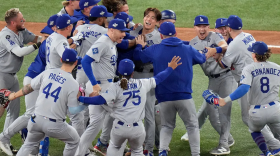Today is Veteran's Day, a holiday I never fail to recognize and think about, though I am not a veteran. That fact is of some consternation to me; has been for a long time. Not because I've grown to support our war in Vietnam that tore apart our country and killed some 58,000 American service people, and possibly as many as 3 million Vietnamese soldiers and civilians.
One of those killed was my best friend, Robert John Gasko, called Bobby, who was killed by friendly fire on January 20, 1970, four months after his 20th birthday. I've mentioned him before in this space and will return there, but I want to spend a minute on my father. He was not a war hero, didn't talk about his service, did his time and got out. And in many ways, he was typical of the classic World War II vet: he went because he, well, kind of had to.
My mom and dad were married on December 7, 1941. Not the recognition day of the Pearl Harbor bombing, the day of the Pearl Harbor bombing. They were leaving for their honeymoon when they found out that my dad's brother had been injured at Pearl Harbor. They cancelled their trip. I mention parenthetically that if you're looking for metaphor, this is a good one. Let's just say that the ending of my parents' marriage is aptly explained by it occurring on Pearl Harbor Day.
Anyway, my father was 28 years old on the day he was married. A year earlier, Franklin Roosevelt had signed into law the Selective Training and Service Act, another name for the draft, the nation's first peacetime draft, though it was obvious war was looming. That act required all men between the ages of 21 and 45 to register for the draft, so, my father was a legally viable draft candidate, though the services obviously wanted younger men.
The way my father described it, and he didn't talk about it unless I dragged it out of him, was that he thought about it and thought about it for a week or so — he had a new business to run, grocery store — but he also had a brother who was wounded and the absolute belief in the integrity of our cause. So, he enlisted in the Navy at age 28. Among his shipmates on the U.S.S. Trenton that served in the South Pacific, he was called Pops. He saw a little bit of action and played a little bit of shortstop on the Navy baseball teams.
One of his best friends, Dave Koch, the man I called Uncle Dave, and who served as the cashier in my father's store, was less fortunate as a combat soldier in the Army. As Dave told it, he crawled into his foxhole the wrong way (you were supposed to jump in legs first) and because Uncle Dave went in the other way, it kept him from getting his head blown off. I'm sure his having a wooden leg, which gave him considerable discomfort, defined his daily life. But again, he rarely talked about it.
Probably most typical of a veteran experience was my late father-in-law, Don Kisselbach. He enlisted at the tender age of 18 because, "that's what you did." He was a smart man with a desire to become an engineer; one he later fulfilled via the GI Bill, and he rose to become Ingersoll Rand's plant manager in Allentown.
Typical of a different era was my friend Bobby, who failed out of college, got drafted, and as I said, was killed by friendly fire, which according to some estimates, caused 35% of the deaths in Vietnam — the fog of war, as it was explained. On this Veteran's Day, understand I cannot fully grasp the experiences of these men, nor the stoicism that kept them from talking about it much. Bobby sent me one letter in his brief two months in Vietnam before his death. "Don't come over here," it read.
I was not one of those veterans, but I do want to remember them.





